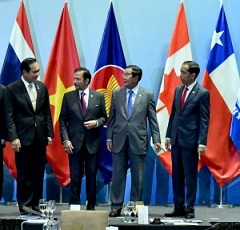Promoting Economic Cooperation is One of Keys to Face Global Challenges: President Jokowi

President Jokowi (right side) at the opening of the 33th ASEAN Summit at Suntec Convention Centre, Singapura, Wednesday (14/11). (Photo by: Bureau of Press, Media and Information)
There are three keys in facing global challenges, namely promoting economic cooperation and fair and free trade, such as the Regional Comprehensive Economic Partnership (RCEP); strengthening monetary and fiscal cooperation, such as the Chiang Mai Initiative Multilateralization (CMIM); and improving domestic economic fundamentals to advance the principles of good governance, President Joko Jokowi Widodo has said.
I hope ASEAN will continue to strengthen synergies with APEC, G-7 and the IMF, President Jokowi said in his remarks at the Working Lunch at Suntec Convention Center, Singapore, Wednesday (14/11).
The President also maintained that everyone that gathered at the event are to strengthen the commitment to continue the open, multilateralism economy. We must prove that trade is not a zero sum game. The open economy and trade can produce win-win results, he said.
To realize the goals, President Jokowi said that there is no other solution but to strengthen the cooperation and synergy.
I also delivered the same message at the opening of the IMF-World Bank Annual Meeting in Bali in October 2018,” the President said, adding that ASEAN also strengthen its commitment and is ready to cooperate with the IMF-World Bank in achieving the SDGs.
For the record, the Regional Comprehensive Economic Partnership (RCEP) is a proposed free trade agreement between the ten member states of the ASEAN (Brunei, Cambodia, Indonesia, Laos, Malaysia, Myanmar, the Philippines, Singapore, Thailand, and Vietnam) and six ASEAN Free Trade Agreement (FTA) partners (Australia, People’s Republic of China, India, Japan, Republic of Korea, and New Zealand).
As quoted in asean.org, the objective of launching RCEP negotiations is to achieve a modern, comprehensive, high-quality, and mutually beneficial economic partnership agreement among the ASEAN Member States and ASEANs FTA partners.
Meanwhile, the Chiang Mai Initiative Multilateralization (CMIM) is a multilateral currency swap agreement between ASEAN plus China, Japan and South Korea, set up in 2010. Its core objectives are to address balance of payment and short-term liquidity difficulties in the ASEAN and the other three nations, and to supplement existing international financial arrangements.
Also attending the occasion were Canadian Prime Minister Justin Trudeau, Chilean President Sebastián Piñera, the International Monetary Fund (IMF) Managing Director Christine Lagarde and leaders of the ASEAN member countries. (BPMI Setpres/ES)
Translated by: Galuh Wicaksono
Edited by: Muhammad Ersan Pamungkas








